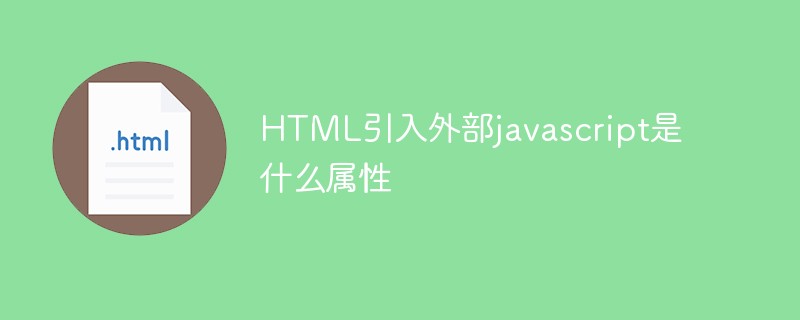What attribute does HTML introduce external javascript?
HTML introduces external javascript through the src attribute of the script tag, which specifies the URL of the external script file; the syntax is "

The operating environment of this tutorial: windows7 system, HTML5&&javascript version 1.8.5, Dell G3 computer.
HTML introduces external javascript through the src attribute of the script tag.
<script> tag is used to define client-side scripts, such as JavaScript. </script>
The script element can either contain script statements or point to an external script file through the src attribute.
Sometimes, we need to run JavaScript in multiple pages of the website. Instead of writing the same script over and over, just create the JavaScript in a separate file, save it with a .js suffix, and reference that file using the src attribute in the <script> tag. </script>
Syntax
<script type="text/javascript" src="value"></script>
| Value | Description |
|---|---|
| URL | The URL of the external script. Possible values are:
|
<!DOCTYPE html> <html> <head> <meta charset="utf-8"> </head> <body> <script type="text/javascript" src="demo.js" ></script> </body> </html>

Note:
Once the <script> tag uses the src attribute, it is used as a reference to an external file rather than inside the editing page. elements of the script. In other words, using src indicates that the element is suitable for referencing an external Javascript file and is not intended to insert a Javascript script into the page. <p></p>This shows that it should not and is not necessary (and useless) to insert code in the <script> tag that uses the src attribute. This can cause unpredictable results and, at least in most browsers, has no practical effect. If you add the following code to the example in this article: <p><div class="code" style="position:relative; padding:0px; margin:0px;"><pre class='brush:php;toolbar:false;'><script src="demo_script_src.js"> document.write("这个输出的内容来自本文件的 Javascript。"); </script></pre><div class="contentsignin">Copy after login</div></div> It may parse the Javascript file referenced by the src attribute normally, but it may not execute any code edited directly within the <script> tag. Obviously, the many special properties of <script> (for example, some of its attributes can only be used for external files) determine that it is impossible to normally execute the referenced external file while taking into account the directly edited content in it. <p>[Related recommendations: <p>javascript learning tutorial<a href="https://www.php.cn/course/list/17.html" target="_blank">]<strong></script>The above is the detailed content of What attribute does HTML introduce external javascript?. For more information, please follow other related articles on the PHP Chinese website!

Hot AI Tools

Undresser.AI Undress
AI-powered app for creating realistic nude photos

AI Clothes Remover
Online AI tool for removing clothes from photos.

Undress AI Tool
Undress images for free

Clothoff.io
AI clothes remover

Video Face Swap
Swap faces in any video effortlessly with our completely free AI face swap tool!

Hot Article

Hot Tools

Notepad++7.3.1
Easy-to-use and free code editor

SublimeText3 Chinese version
Chinese version, very easy to use

Zend Studio 13.0.1
Powerful PHP integrated development environment

Dreamweaver CS6
Visual web development tools

SublimeText3 Mac version
God-level code editing software (SublimeText3)

Hot Topics
 1386
1386
 52
52
 Table Border in HTML
Sep 04, 2024 pm 04:49 PM
Table Border in HTML
Sep 04, 2024 pm 04:49 PM
Guide to Table Border in HTML. Here we discuss multiple ways for defining table-border with examples of the Table Border in HTML.
 HTML margin-left
Sep 04, 2024 pm 04:48 PM
HTML margin-left
Sep 04, 2024 pm 04:48 PM
Guide to HTML margin-left. Here we discuss a brief overview on HTML margin-left and its Examples along with its Code Implementation.
 Nested Table in HTML
Sep 04, 2024 pm 04:49 PM
Nested Table in HTML
Sep 04, 2024 pm 04:49 PM
This is a guide to Nested Table in HTML. Here we discuss how to create a table within the table along with the respective examples.
 HTML Table Layout
Sep 04, 2024 pm 04:54 PM
HTML Table Layout
Sep 04, 2024 pm 04:54 PM
Guide to HTML Table Layout. Here we discuss the Values of HTML Table Layout along with the examples and outputs n detail.
 HTML Input Placeholder
Sep 04, 2024 pm 04:54 PM
HTML Input Placeholder
Sep 04, 2024 pm 04:54 PM
Guide to HTML Input Placeholder. Here we discuss the Examples of HTML Input Placeholder along with the codes and outputs.
 HTML Ordered List
Sep 04, 2024 pm 04:43 PM
HTML Ordered List
Sep 04, 2024 pm 04:43 PM
Guide to the HTML Ordered List. Here we also discuss introduction of HTML Ordered list and types along with their example respectively
 Moving Text in HTML
Sep 04, 2024 pm 04:45 PM
Moving Text in HTML
Sep 04, 2024 pm 04:45 PM
Guide to Moving Text in HTML. Here we discuss an introduction, how marquee tag work with syntax and examples to implement.
 HTML onclick Button
Sep 04, 2024 pm 04:49 PM
HTML onclick Button
Sep 04, 2024 pm 04:49 PM
Guide to HTML onclick Button. Here we discuss their introduction, working, examples and onclick Event in various events respectively.




